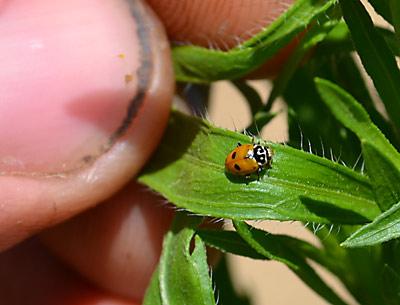‘Lost’ Ladybug Still Thriving At Quail Hill

Thought to be extinct in the state, a thriving colony of nine-spotted ladybugs, Coccinella novemnotata, was found last summer at the Peconic Land Trust’s Quail Hill Farm in Amagansett.
Peter Prioto, who worked at the time for Cornell Cooperative Extension, found the first of the rare insects on top of a sunflower during a ladybug search he had organized at Quail Hill. The species has been sought throughout the country, but the only other recent spotting has been in Georgia in 2007.
On Tuesday, Cornell Cooperative Extension scientists and interested members of the community returned to the farm to see if the insects had continued to occupy their established habitat, and were pleased to find that the answer is yes.
Mr. Prioto, who is now part of a community supported agriculture project he started in Center Moriches, said he expected them to be there, knowing the quality of the grounds and practices of the farm. Pointing out the variety of vegetables found in a four-foot area, he said, “Diversity in crops creates diversity in bugs.” All of the scientists in attendance agreed that more ladybugs are found on organic farms than traditional farms that use pesticides. Ladybugs, Mr. Prioto said, help farms greatly when they are present, since they prey on insects like aphids that are known to suck the fluid from plants.
John Losey, the director of the ladybug project and associate professor of entomology at Cornell University, and Leslie Allee, director of outreach and education for the extension, found two of the special creatures “just standing here,” he said with a smile on Tuesday. The two scientists took the 115 collected ladybugs — eight different species — back to Cornell University’s Ithaca laboratory to further their research into the decline of the beneficial insects.
“We’ve confirmed that the rare nine-spotted ladybug does indeed have an established population on the farm,” Ms. Allee announced in an e-mail on Tuesday evening, adding that “so far no one has found the nine-spotted ladybug at any other farm in the area.”
The scientists hope that “everybody will collect ladybugs, wherever they are, and submit pictures to the project online.” The project’s Web site upload page, lostladybug.org, already contains over 17,000 individual pictures, received and identified in databases. In addition to a photograph, contributors are asked to include data such as the length of time searched and the habitat in which the insect was found.
The research will help in the understanding of trends, populations, and preferred plant environments.
The Lost Ladybug Project will return to Quail Hill on July 31 from 10 a.m. to noon.
